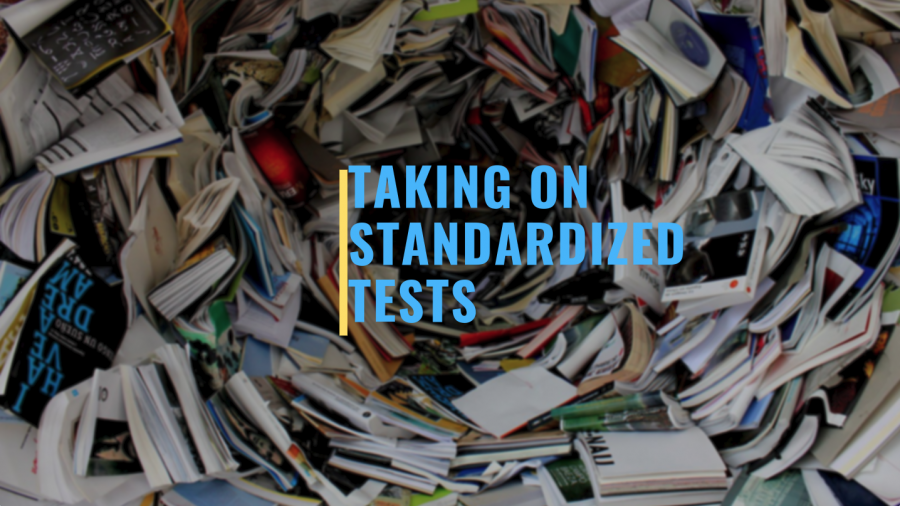Taking On Standardized Tests
October 21, 2019

Standardized tests are one of the most dreaded experiences among high school students. No one likes having to wake up early on a Saturday morning and spend three hours in a classroom being tested on their reading comprehension, grammar, and math skills. There’s already plenty of test-taking stress for high school students Monday through Friday.
Taking these tests is like ripping off a Band-Aid: the faster you complete it, the better. You obviously want to get an ideal test score the first time you take the ACT or SAT instead of the third or fourth time. To do that, you have to be prepared. If you know the right tips and tricks, you can get it done on your first try and lift that massive burden from your shoulders.
The most important piece of advice is to practice. Do multiple practice tests, and make sure to time yourself. Time is by far your biggest enemy when taking standardized tests, so learning how to pace yourself is a crucial proponent to success.
Practice individual sections, not entire tests.
There are two main reasons for doing this. First, it’s easier to motivate yourself to do a singular section compared to an entire practice test. The only thing worse than having to take a standardized test is taking a practice standardized test. But if you break it up into chunks, it seems a lot more manageable and takes up less of your free time.
Second, if you are an ace at the ACT math section yet struggle with the reading section, why bother taking an hour to refine your already sharp math skills when that time could be spent improving your weaknesses? Work smarter, not harder. The only problem with this strategy is that it will not prepare you for the soul-crushing feeling of testing for three straight hours that makes it near-impossible to focus by the last section.
However, that problem is fleeting.
Starting in Sept. 2020, students will be able to retake individual sections of the ACT instead of having to sit through the entire exam again if they only want to improve their score in a certain section. This will save students time and money. It’s a tough break for those seniors who had to sit through the entire test just because they needed to improve their reading section, but a blessing for juniors and underclassmen.
When reviewing your work on these practice sections, hone in on your mistakes. It wasn’t fun for me to look over all of the things I did wrong, but it was the only way I could grow as a test-taker. I studied my mistakes until I knew exactly what I did wrong and was sure that I would never repeat them on the real test.
One of the most important tips I learned during the process was how to get through the reading sections of both the ACT and SAT as fast as possible.
I put my finger under the text I was reading and went through the passage as fast as I could, skimming and trying to get a general understanding of the content. Moving my finger along the text helped me to comprehend what was going on despite the fast pace.
Next, I moved onto the questions. When there was one about a specific area of the passage, I would go back to that section and read it more in-depth, looking for definite evidence to answer the question. This speed-reading strategy was very effective for me and dramatically increased my reading score, but it took me lots of practice reading passages to get good at it.
For the math sections, I realized that the best strategy was doing all of the questions that I knew first. If there was a question that I didn’t know or seemed like it would take a long time, I would just skip it.
With time being such a scarce resource, it was best to spend it on problems that I was confident I could correctly and quickly do. Once I finished all of the problems that were familiar to me, I went back to the problems that stumped me and tried to finish those. Some of them took me a long time and put a serious dent in my time. However, since I had already completed almost all of the other questions, the impact of these time-draining questions was negated.
It’s tempting to just jump to the underlined words in the English section of the ACT (referred to as the writing section of the SAT) as those are the ones that there are questions for. However, it’s essential to read the entire passage. Context is everything for this section.
The vast majority of my mistakes in this section were because I was too lazy to read every word and consequently chose the wrong verb tense for the underlined word or phrase. Furthermore, reading the sentences in my head made it easier for me to identify unnecessary commas and other grammatical mistakes in the passage. There are no shortcuts to success in this section.
The SAT only has math (with and without calculator), reading, and English sections. The ACT, on the other hand, has a science section.
The key to this section is not trying to decipher the charts and graphs that they throw at you until you read the questions. Read a question, find whatever graphic has the data you are looking for, and fill in the answer. All of that information can be overwhelming and seem very confusing, but knowing precisely what I was looking for before even looking at it made it seem a lot less overwhelming. Find the data you need to solve each problem and ignore everything else.
The night before the test, don’t overwork yourself.
Try to stay relaxed and only do a little bit of review if you feel like it’s absolutely necessary. Hanging out with friends instead of doing last-minute cramming won’t have an impact on your score if you have done enough to prepare in the weeks before. Additionally, have a nice breakfast the morning before the test. You’re gonna need all the energy that you can get.
And, of course, if you can do nothing more to pick an answer, always guess C.







Dixie • Oct 22, 2019 at 6:59 am
^ Ok Boomer
Mike • Oct 21, 2019 at 4:34 pm
Unbelievable that TFS would support the ACT and the SAT. These tests scam us of our money and quantify kids. Kids are more than just a number, TFS, shame on you for supporting these horrific scams.
AJ Shaw • Oct 22, 2019 at 8:15 pm
Mike, he never even gave support to Standardized Tests and even if he did, his opinions do not reflect the opinion of our paper.